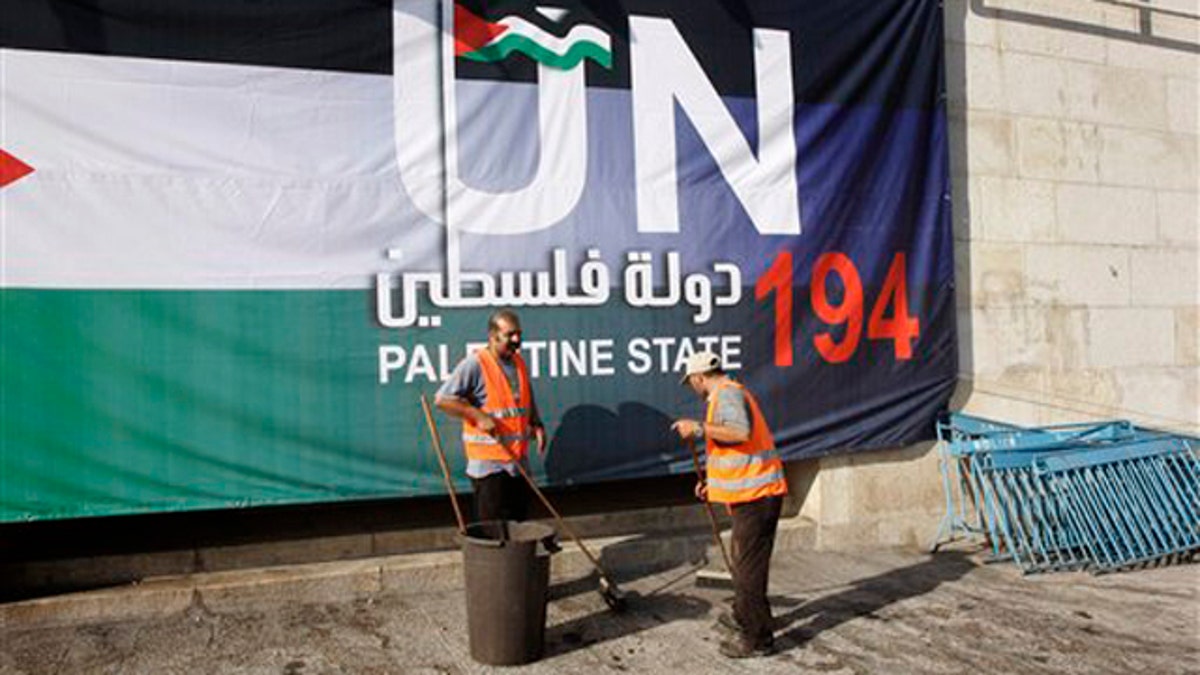
Palestinian municipality workers clean a street during a rally to support the Palestinian statehood bid in the United Nations, in the West Bank town of Bethlehem Sept. 18. (AP)
The looming showdown at the United Nations this week over Palestinian statehood could be either a "once-in-a-lifetime" opportunity to restart peace talks or the spark that inflames a new wave of violence in the region, officials said Sunday.
U.S. and European officials are scrambling to avoid or delay the vote. Senior diplomatic figures were holding a round of talks Sunday to at least minimize the fallout from the Palestinians' push to seek recognition at the U.N.
So far, Palestinians are not backing down. A top Palestinian envoy said in an interview Sunday that the delegation will move forward unless they're presented with a "viable alternative."
Absent a compromise, analysts and officials warn that the statehood push will have dire consequences for all parties. The United States would be compelled to veto the proposal in the Security Council, potentially harming U.S. credibility in the Arab world. Though the bid is unlikely to pass the Security Council, a separate affirmative vote in the General Assembly would give the Palestinians "observer" state status and access to the International Criminal Court, as a vehicle to pursue charges against Israel. The chances for renewed peace talks could further erode.
And in the near-term, the high drama has the potential to fuel "bloody" unrest along the Israeli-Palestinian border, said Dan Gillerman, former Israeli ambassador to the United Nations.
Should the full U.N. approve the bid, Gillerman said expectations among the Palestinians over the vote are so high that they will unquestionably be deflated when the people discover that little has changed on the ground in the Gaza Strip and West Bank. That, he said, creates the potential for havoc.
"The next day after this resolution is carried in the United Nations, the average Palestinian ... will look around him, nothing would have changed. And there will be a lot of frustration," Gillerman told Fox News. "Frustration leads to violence.
"We already live in a very tough neighborhood. It's going to be tougher, not just for us, but for the Palestinians. And it's going to be a lose-lose situation for the U.S., for Europe, for the Palestinians, and for Israel," he said.
Gillerman, though, held out hope for a starkly different outcome. Reflecting the widespread view among Israeli and U.S. officials that true statehood and peace can only be achieved through negotiations, Gillerman urged President Obama to use this high-stakes moment to get Israeli Prime Minister Benjamin Netanyahu and Palestinian Authority President Mahmoud Abbas to commit to a new round of negotiations, with a deadline.
"I think he has the opportunity, maybe a once-in-a-lifetime opportunity, to make it happen," Gillerman said.
Former British Prime Minister Tony Blair, speaking on ABC's "This Week," also expressed hope that the tension could give way to negotiations.
"Palestinians feel that they should go to the United Nations, and by the way, they're perfectly entitled to go there. But I think what we will be looking for over the next few days, is a way of putting together something that allows their claims and legitimate aspirations for statehood to be recognized whilst actually renewing the only thing that's going to produce a state, which is a negotiation directly between the two sides," said Blair, who is involved in the peace process.
That process, though, has been stalled for about a year. Prior commitments to return to the negotiating table have fizzled, and there's no guarantee that a new round of peace talks would yield a different result.
Still, the scramble for compromise continues with envoys from the international "Quartet" of Mideast peacemakers -- the U.S., the E.U., the U.N. and Russia -- gathering on Sunday followed by talks between Secretary of State Hillary Rodham Clinton and E.U. foreign policy chief Catherine Ashton.
Clinton was mum Sunday when asked about the progress of talks. "We are meeting to talk about the way forward," she said.
The Quartet is still seeking to craft a statement that could restart peace talks. Such a statement would offer the Palestinians a modest upgrade in status, address Israel's demand that its identity as a Jewish state be upheld and lay out a broad timeline and parameters for renewed negotiations, officials said.
The best-case scenario would see the Quartet issue a statement that would then be endorsed by the U.N. Security Council or General Assembly or both and be followed by face-to-face meeting between Netanyahu and Abbas.
But it may be too late.
Maen Rashid Areikat, the Palestinian Liberation Organization representative to the U.S., said on CNN's "State of the Union" that while they "don't disagree" with the call for negotiations, "the problem is that there are no negotiations."
"Unfortunately, the Israelis did not want to sit and engage," he said. "We don't want negotiations for the sake of going back to negotiations, getting engaged in a process that will not produce peace."
On the same program, Israeli Ambassador to the U.S. Michael Oren claimed peace is not the Palestinian delegation's goal.
"Israel wants peace," he said. "The Palestinians want all the territory without the peace. They're end-running this peace process."
Former President Bill Clinton, speaking on NBC's "Meet the Press," said the United States' key goal at this point should be to ensure the U.N. vote doesn't jeopardize the broader process.
"We've got to contain the fallout, because when this is over, the underlying reality won't change, and we still believe there should be a Palestinian state, and we still believe there should be cooperation between Israel and our Arab neighbors," Clinton said. "So, I don't know what's going to happen. I just know that this is one of those deals where we're either going to go forward, or fall back, and I favor going forward."
The Associated Press contributed to this report.




